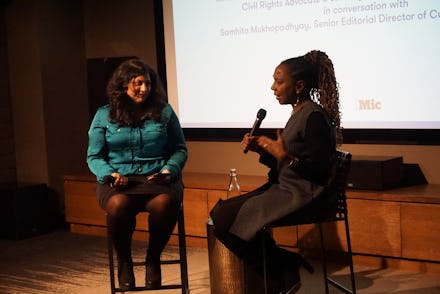Kimberlé Crenshaw reveals what Donald Trump and Clarence Thomas have in common

Legal theorist Kimberlé Crenshaw is known for coining the term "intersectionality" to describe the interlocking ways racism, sexism and classism inform the experiences of women of color.
She drew on that work in recent years to highlight the needs of girls and women of color who were left out of the Obama administration's wide-ranging programming, My Brother's Keeper. But in order to make sense of Donald Trump's election, and the support white women showed him at the polls despite an avalanche of sexual assault allegations, Crenshaw, who spoke at Mic's Women in Media breakfast on Dec. 1 in New York City, drew on another powerful man whose alleged sexual predations had been raised, and then ignored: Supreme Court Justice Clarence Thomas.
In 1991, Thomas was awaiting confirmation to the Supreme Court after being nominated by President George H. W. Bush. He was on his way to becoming only the second black Supreme Court justice when Anita Hill, then a law professor and Thomas' former colleague at the Department of Education and Equal Employment Opportunity Commission, came forward with devastating accounts of Thomas' ongoing sexual harassment.
Hill testified about the harassment she'd experienced in front of the U.S. Senate Judiciary Committee — and she'd assembled a legal team that included Crenshaw. In what Thomas would later infamously call a "high tech lynching," Hill testified that Thomas would brag about his sexual conquests and once came over to her desk and asked aloud, "Who has put a pubic hair on my Coke?"
The testimony was damning, but the public's reaction was perhaps even more telling. While Hill's testimony put the plague of sexual harassment front and center on the American stage, it did so in front of an all-white, all-male committee, who in the end simply ignored it.
Worse still, Hill described an experience that was all too familiar to black women in the workplace, but some segments of the black community complained that coming clean about it wasn't fair to the overall progress that Thomas' presence on the court would symbolize. As she later recalled to Time, ahead of the HBO film that premiered in April about the saga, "It was very painful personally because what I felt was being said was that his experience as an African-American man mattered more to the race than my experience as an African-American woman."
Fast-forward to the election of Trump, and Crenshaw, who had a front-row seat throughout Hill's testimony, sees history repeating itself. Thomas' confirmation "actually made possible this moment," Crenshaw said about Trump's election. "We just have to go back and think about all the 5-4 decisions that were made possible by Clarence Thomas, including the gutting of the Voting Rights Act."
"The failure of both the media and leading commentators within anti-racist movements and feminist movements to be able to tell a story about sexual harassment that didn't force Anita Hill into either being an ungendered black subject or a woman without any race contributed to the bifurcation of communities that should have been able to be aligned against Clarence Thomas," Crenshaw said.
Crenshaw also details the forgotten history of black women and sexual assault and lifts it up as a call to action.